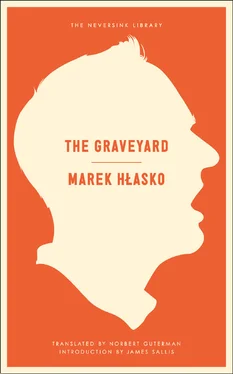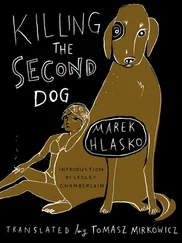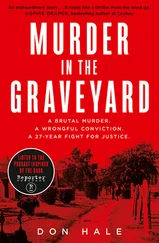“What about Jerzy?”
“Does he think the same way?”
Both fell silent; and suddenly the stillness was solemn. Outside the window, invisible, the city hummed in the darkness, like an enormous insect. Shadows and lights darted across the ceiling; the stove creaked monotonously; and both of them, Franciszek and the painter, suddenly felt the presence of something great, something that was true and solemn; it was as though Eternity had come closer with its indifferent face that no one has ever fully seen.
“Yes,” the painter said at last. He bent his enormous head, staring at his paint-corroded hands that lay folded on his knees. “Maybe he is different. Men like him do not perish.” He raised his head abruptly. “Listen,” he said. “Go to see him. Go right away; don’t wait. He alone can help you. He was the best of us. The purest. He’s the only man you can trust. Go.”
“Come with me,” Franciszek said. He looked at him searchingly, and saw a sudden gleam in the other’s eyes, brief as the beat of a wing. Then again his eyes were like those of a statue.
“No,” he said, “I’ll never go …” He pointed to the gleaming busts. “I have commissions; I must work. This is the only hope.”
“What is?”
“To wait,” the painter said, “to wait in the hope that I’ll live to see the day when people smash my masterpieces openly. That’s the only thing. Adieu.”
“What shall I tell him about you?”
“About me? A message from me?”
“Well?”
“That’s easy, Franciszek,” the painter said. “That’s easy. The same as about all of us. That I am dead. Goodbye. Come back someday for a cup of tea.”
Franciszek left. Again he walked down the dark corridor; cats and dogs were squealing; he tottered in the dust and darkness, pulling the cuffs of his trousers out of the grasp of one child’s hands after another’s.
“IS TODAY SUNDAY?” FRANCISZEK ASKED.
“No,” Elzbieta said, “only Friday.”
He put down his shaving things, and turned away from the mirror. “Then why don’t you go to your courses?” he asked.
She was silent, her head bowed. Her eyes were swollen, ringed with blue circles; in the last few days her face had become strangely small and gray, and the corners of her mouth drooped. He came over to her and stood helpless, waiting for her to give some sign of life; but she sat motionless, with a hostile expression she had never shown before. “Well,” he said.
“I have no courses today,” she said. “Neither today nor tomorrow …”
She tried to rise, but he held her down. “My little girl,” he began.
She pushed him away with unexpected force, as though this pet name were particularly repulsive to her. “Go away.”
“What happened?”
“Nothing happened,” she cried. “Why should anything happen? Just leave me alone.”
He went out without breakfast, hungry, badly shaved. Still no sign of spring; for weeks now it had been raining and sleeting; for weeks the city had been drenched. The dampness was of a special kind, dirty, loathsome, unbearable, for the branches of the anemic trees remained hard and dry. The fat eye of the sun blinked in the gray sky — its presence was pointless and only made one angry. “What’s the matter with this spring?” he thought, as he walked along staring at the sky. “Have I ever lived through such a spring?” At the corner he saw a telephone booth; there was no one behind the glass door. He entered, dialed, and once again heard the same woman’s voice.
“May I speak to Jerzy?”
“Who is it?”
“Kowalski,” he said. “Franciszek Kowalski … So Jerzy is back?”
“Please hold on a minute,” the woman said, and put down the receiver. He waited with a pounding heart. Finally she came back. “Jerzy is a bit unwell,” she said. “Can you come this afternoon?”
“Yes,” he said, “of course. I’ll come straight from work. Goodbye.”
“Hullo,” the woman said in a hushed voice. “Just a second. Can you hear me? Jerzy is a bit unwell. Jerzy doesn’t feel well. Please remember that. You do understand me, don’t you?”
“Yes,” he said; “it’s no wonder in this weather. Goodbye.
I’ll come right after work.”
He hung up and walked out; again he hurried to work through crowds of peevish people cursing one another, trampling on one another’s toes. Someone loudly threatened to report the conductor, who barked back from the other end of the car, “You make it hard for people to work.” “Oh, stick it up …” “Go f— yourself.” Franciszek looked at the damp gray walls passing outside the window, and thought, “Spring, spring …” “You’re a tramp!” a fat man shouted, waving his brief case over the passengers’ heads. “Do you hear me?” “And you, you’re a Soviet scientist.” The passengers crowding the platform squealed timidly with joy. “What’s the matter?” a brisk, familiar voice said suddenly. “Someone here that doesn’t like it? Tell the truth; do you like it or don’t you?” “Here you are,” Franciszek thought. “Here you are; I’ve been waiting for your voice. You had to come …” The car stopped; Franciszek stood on his toes, and looked out; the policeman was marching a group of arrested men down the street.
Several hours later the siren howled; he could hardly wait for its second howl, the one that marked the end of the working day; and when finally he heard it he was the first to run across the courtyard, deafened by the sound of his own heart, which did not stop pounding even when he stood in front of Jerzy’s door. He stood with his arms dangling, without the strength to ring the bell. He was silent, paralyzed before the last door of this city. He was silent even when the lady of the house helped him with his overcoat, and he heard nothing of what she said to him as she led him through the entrance hall — it was strangely long, somehow old-fashioned, dark, full of cabinets, chests, and infernal rugs that made walking hazardous. At last he entered the living room. “Jerzy,” he said, “Jerzy.”
Tears veiled his eyes, and he could not see the man standing before him, saying something in a loud voice and vigorously shaking his hand. He was not ashamed of his tears and his stammering. He knew that he had finally reached some sort of destination, that he had come to the end of his wanderings, and that he had achieved peace; he did not know what kind of peace, but it was peace. At last he recovered himself, and looked at the other. Before him stood a miserable skeleton with sunken cheeks and completely lusterless eyes, in a suit pitifully too large for him — his thin arms protruded ludicrously from the baggy sleeves. This was Jerzy; nothing else was important. They sat down, stammering and patting each other’s knees.
“Well, Franciszek,” Jerzy said. “What’s new with you?”
“Jerzy,” Franciszek said. “This won’t sound clever. I don’t even know how to say it. I only know my reason for coming here. Give me again what you gave me once before. Once, in the woods. Once when I was near the end.”
“What is it, Skinny?”
They smiled at each other, looking straight into each other’s eyes. Franciszek started: the skeleton sitting before him had smiled, uncovering the toothless gums of an old man.
“What is it, Skinny?” the former commander repeated.
“Faith. Faith in something, anything. If only in the fact that you haven’t changed.”
“I have not changed,” Jerzy said. He said it too quickly. Franciszek saw fear in his eyes. Or perhaps it was not fear; but whatever it was, it was not faith. He smiled, and said, “You have changed.”
“Faith,” Jerzy said. He rose and approached Franciszek, and put his emaciated hands on his shoulders. “Where is your faith, Franciszek?” he said, looking at him sternly. “Where is your faith? Don’t you see anything?”
Читать дальше






![Ричард Деминг - Whistle Past the Graveyard [= Give the Girl a Gun]](/books/412176/richard-deming-whistle-past-the-graveyard-give-t-thumb.webp)


